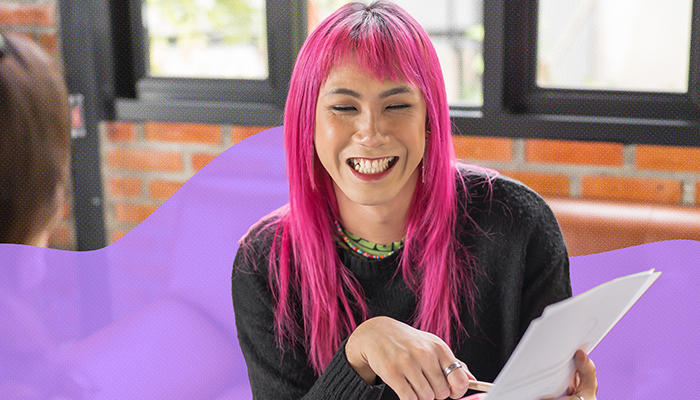“If we'd still seen transness as a binary, I don't think I would’ve even started transitioning,” said Willow Pill, winner of RuPaul’s Drag Race Season 14, to the rest of us in the dressing room. “But with that conversation being more open, I saw that there is actually room for me to transition in the way that I want to.”
During the early days of the pandemic, gender performativity for perception became obsolete. Alongside quarantine, transgender discourse continued to blossom and many finally heard the language to accurately name their experience. We spent weeks being with ourselves and our thoughts, which for many became the ultimate form of therapy. Finally, the self-obsessed generation could turn their gaze past the selfies and deeper within their own psyche. Since 2020, the search interest for “transgender”, “hrt”, and “trans woman” have been steadily increasing, according to Google Trends.
“Bimini was a big inspiration for me and Adore too. Not necessarily for their transness but how they present themselves in their everyday lives,” Willow added. “My ideal trans identity is a tomboy lesbian.”
“Then you are succeeding, girl,” Bosco exclaimed and the room erupts in yassified laughter.
"If we'd still seen transness as a binary, I don't think I would’ve even started transitioning. But with that conversation being more open, I saw that there is actually room for me to transition in the way that I want to.” - Willow Pill
Drag Race Season 14 has been labeled the most trans season yet. Kerri Colby and Kornbread were the first two openly transgender competitors in the initial cast reveal. Then, as the competition progressed more girls joined them. Jasmine Kennedie came out as trans in an emotional— and award-worthy—moment during Untucked with her fellow competitors. Bosco had begun hormone replacement therapy (HRT) after filming the season and publicly came out as trans after a few episodes of Season 14 aired. Then, a month later, Willow came out as a non-binary trans femme on Twitter. These five queens were dubbed “The Sisterhood of the Traveling Estrogen” by mother Kerri Colby in the reunion episode.
“We have a spidey sense for each other. We understand when one of us is going through it because of the estrogen,” Kerri said of the sisterhood.
“We all mesh well because we enjoy the same trauma,” Kornbread added comedically. She has the same personality as she did on TV, exuding an affectionate and inviting energy that puts the whole room at ease. Within the first minute of her being on set earlier, everyone was laughing.
Kornbread first started talking about her transition with her drag mom, Calypso Jeté Balmain, winner of the first season of Legendary with her House of Balmain. As Kornbread became closer to Kerry through the Los Angeles drag scene and filming of the show, Kerry became the new recipient of her phone calls.
“Every time I had a mood swing, this one would have to deal with it,” she said motioning over to Kerry sitting in the corner all goddess-like and beautiful. Kerry laughed and I remember hearing angels sing.
“We’re all at different parts of our transition,” added Jasmine Kennedie. “And we can check in with each other about how someone was feeling during a specific moment in their transition when we’re going through it.”
Even in a group of five trans femme queens (six if you include me), each one displayed femininity and gender in a unique arrangement of fashion, makeup, mannerisms, and humor. While Kerry sits on the high-femme point of the transgender spectrum—an absolute bombshell of a woman—someone like Willow is more comfortable in transness beyond the gender binary. There has and always been nuance in transness despite society’s obsession with reducing the community to either of two three-letter acronyms (MTF or FTM).
“This season showed the wholeness of transess to society. Everyone thinks it’s just a man trying to be a woman or vice versa and it’s really not. It’s this whole mental and physical evolution within yourself,” said Jasmine.
“At the end of the day, part of why we succeed and why people love watching our transition is we are very unapologetically honest about who we are, and that's because we had to find that truth,” - Kerri Colby
That journey to evolve will never look the same from one person to the next. A common issue within the trans community is comparing ourselves with our brothers, sisters, and siblings, and comparison is the enemy of joy. Once we move on from trying to be someone else, we find ourselves. “No one in here wants to look like the next person,” said Kornbread.
This is true not just for each of these queens’ identities, but also for drag. I mean, that’s why the show exists: to find the next drag superstar who has charisma, uniqueness, nerve, and talent. Each of the queens on the show, cis or trans, has a specific brand, and aesthetic they put on when in drag. What’s unique is that for cis individuals, drag can be a medium to embody a woman's identity, whereas for trans queens, it’s themselves, but more dramatic, more draggy.
“My drag was never separate from what I see myself as trans. It was me projecting, trying to give what I always wanted. And now I found that to be what I do every day,” said Kerri.
“I'm on the opposite end. I like to think of Bosco as a character that I can step into,” Bosco chimed in. “My point of reference for characterization has always been Elvira. She doesn’t look like Elvira during the day, it’s something she puts on at night.”
For these five queens, drag was a medium in which to explore their transness, a gateway, if you will. But when I asked if someone who’s questioning if they’re trans or not should explore drag first before coming out, they all give an emphatic no.
Surely, there are many parallels and similarities between drag and transness: the heightened characterization of self, the performance of extreme femininity (or masculinity), and being convincing enough for others to understand. However, ultimately, one is artistic expression and the other is expressing one’s truth.
“You really need to sit down with yourself and ask the hard questions: What do you like about yourself? What do you not like? And can you change those things?” said Kornbread. “But if you’re thinking about doing drag, quit now. And if you’re thinking of applying for a TV show, don’t.”
For many parents, family, and friends, someone transitioning can feel like a loss of a person, who once was is no longer. But that, too, doesn’t need to be the sole discourse around transitioning. Many transgender people would agree that transitioning actually allows them be more fully themselves. For many, it even led to embracing their masculinity or femininity even more than when they were identifying as cisgender.
“Just because I’m losing the identity of being a man, doesn’t mean I’m losing myself. I’m gaining the fact that I’m a woman,” Jasmine added. “Why not get the best of both worlds, baby? I’m a Gemini.”
“At the end of the day, part of why we succeed and why people love watching our transition is we are very unapologetically honest about who we are, and that's because we had to find that truth,” mother Kerri weighed in. “It's so precious to all of us now that we would never trade it.”
“Do you see why she convinced all of us to transition?” said Bosco. The room explodes with laughter again.
At that moment, I saw it for myself. This is trans joy.
__
FOLX Health is the first digital healthcare company designed by and for the LGBTQIA+ community. Our services include virtual primary care, gender-affirming hormone therapy including estrogen and testosterone (HRT), mental health care, sexual and reproductive health care, preventive care, and fertility consultations. FOLX memberships give you access to LGBTQIA+ expert clinicians, peer support, thousands of LGBTQIA+ resources, and more. Whether you’re lesbian, gay, bisexual, transgender, queer, gender non-conforming, or nonbinary, you can find LGBTQIA+-specialized health care that helps you meet your wellness goals. FOLX Health is health care that's queer all year. Get all the benefits of becoming a FOLX member and sign up today!



